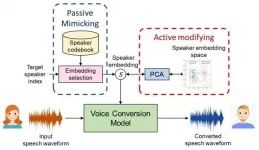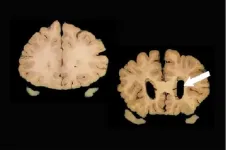Common inflammatory bowel disease treatment blunts COVID-19 vaccine response
People who take a commonly-prescribed drug for inflammatory bowel disease (IBD) should not assume they are protected after a first dose of COVID-19 vaccine, after a large-scale study found many had poor antibody responses.
2021-04-26
(Press-News.org) People who take a commonly-prescribed drug for inflammatory bowel disease (IBD) should not assume they are protected after a first dose of COVID-19 vaccine, after a large-scale study found many had poor antibody responses.
The research measured antibody responses after vaccination with the Pfizer/BioNTech or the Oxford/AstraZeneca COVID-19 vaccine in 865 people treated with infliximab, an anti-tumour necrosis factor (anti-TNF) biologic drug, prescribed to around two million people worldwide. Anti-TNF drugs are effective treatments for immune-mediated inflammatory diseases, but by suppressing the immune system, they can reduce vaccine effectiveness and increase risk of serious infection.
Led by the University of Exeter and the Royal Devon and Exeter NHS Foundation Trust, and published in GUT, the paper is an output from the CLARITY Study is funded by the NIHR and Crohn's and Colitis UK. The research found that people treated with infliximab had significantly lower concentrations of antibodies, when compared to 428 people on an alternative treatment, vedolizumab.
Vaccines work by stimulating the immune system to produce antibodies that protect individuals from any future infection. For a vaccine to be effective, it needs to trigger a sufficient number of virus-targeting antibodies to prevent any subsequent infection.
After a single dose of vaccine, only about one third of participants (103 of 328) treated exclusively with infliximab generated adequate levels of antibodies to the virus for the vaccine to be considered effective. In participants simultaneously taking infliximab and immunomodulator drugs, such as azathioprine or methotrexate, the levels of antibodies were even lower after a single vaccine dose; only 125 of 537 met the threshold of a positive antibody test.
However, in a sub-group of people who had previously been infected with COVID-19, and also in the few patients studied who had already had a second dose of vaccine, the vaccine-triggered antibody responses rose significantly, indicating an effective response after two exposures. Based on these observations, the researchers conclude that people taking anti-TNF drugs should be considered a priority for a second vaccination.
The CLARITY study recruited 6,935 patients with Crohn's disease and ulcerative colitis from 92 UK hospitals between September and December 2020, to investigate the impact of these drugs on COVID-19 susceptibility and protective immunity that follows infection or vaccination. Previously, the study found that infliximab blunts the immune system to COVID-19 infection, potentially increasing the risk of reinfection.
CLARITY study lead Dr Tariq Ahmad said the current findings had important implications for people treated with anti-TNF therapy, particularly for those also treated with an immunomodulator. He said "Poor antibody responses to a single dose of vaccine exposes these patients to a potential increased risk of COVID-19. However, we found much higher antibody levels in people vaccinated after a previous COVID-19 infection and in the small number of patients who had received two vaccine doses suggesting that all patients receiving these drugs should be prioritised for optimally timed second doses."
500,000 people across the UK live with Inflammatory bowel disease (IBD) of which ulcerative colitis and Crohn's disease, are the two main forms. Symptoms include urgent and frequent bloody diarrhoea, weight loss, pain, and extreme fatigue. At the start of the COVID-19 pandemic the UK Government advised that patients taking anti-TNF medicines could be at increased risk of complications from coronavirus. All were advised to follow strict social distancing measures, and some, depending on the severity of their condition, were advised to shield.
Co-author Dr Nick Powell, of Imperial College London, said: "Although we know that this has been an incredibly difficult time for people with IBD, our research indicates that people treated with infliximab should consider that they are not protected from COVID-19 until they have had both doses of a vaccine and should continue to practice enhanced physical distancing and shielding if appropriate."
In the study, a small sub-set of patients showed no antibody response even after two exposures to COVID-19. Co-author Dr James Goodhand, of the University of Exeter, said: "Our findings come as countries across Europe are opting to delay the second dose of vaccine. We recommend prioritizing second doses to patients taking anti-TNF drugs, who will remain at high risk after their first dose. Further data are needed to investigate whether we should be testing antibody concentrations after two doses to identify the small number of patients who have not responded well to vaccination."
The study also found evidence that antibody responses were lower in current smokers and participants aged 60 or older, but higher in non-white participants. These findings warrant further investigation in larger studies before firm conclusions can be drawn.
Sarah Sleet, Chief Executive of Crohn's & Colitis UK, said: "This is the first robust evidence that people with Crohn's and Colitis - who may need to take specific drugs to suppress their immune system - do not develop the expected antibodies after their first vaccination dose, although a second dose does improve antibody levels. With 1 in 5 not developing antibodies even after 2 doses, these people will be desperately worried that they remain at risk of catching COVID-19 and may develop a more serious illness at a time when shielding has ended. We need urgent research on the optimal time between the first and second jabs, and the need to be prioritised for any booster jab this Autumn."
INFORMATION:
The paper is entitled 'Infliximab is associated with attenuated immunogenicity to BNT162b2 and ChAdOx1 nCoV-19 SARS-CoV-2 vaccines in patients with IBD'.
ELSE PRESS RELEASES FROM THIS DATE:
2021-04-26
The Chauvet Cave, which lies by the entrance to the Gorges of the Ardèche, is home to the world's oldest cave paintings, dating back 36,000 years. Their state of preservation and aesthetic qualities earned them a spot on the World Heritage List in 2014, 20 years after their discovery. The location of the cavern--surrounded by a remarkable landscape, next to the Pont d'Arc natural archway--raises the question of whether the people who executed these artworks looked and walked out upon the same landscape as today. Did they see the same natural archway? Scientists from the CNRS, Université Savoie Mont Blanc, and the Muséum National d'Histoire Naturelle1 ...
2021-04-26
Researchers from Skoltech (Russia) and their colleagues from SINTEF (Norway) have developed a mathematical model of freezing water droplets moving in cold air. This model is a part of a joint RFBR-supported Russian-Norway research project. The project is focused on predicting ice accretion on ships and other offshore structures operated in Arctic climate, which may interfere with their proper functioning and endanger crew members and cargo. The paper was published in the journal Energies.
Ships travel in cold northern waters under constant bombardment by tiny water droplets populating the chilly air. ...
2021-04-26
Ishikawa, Japan - Robots today have come a long way from their early inception as insentient beings meant primarily for mechanical assistance to humans. Today, they can assist us intellectually and even emotionally, getting ever better at mimicking conscious humans. An integral part of this ability is the use of speech to communicate with the user (smart assistants such as Google Home and Amazon Echo are notable examples). Despite these remarkable developments, they still do not sound very "human".
This is where voice conversion (VC) comes in. A technology used to ...
2021-04-26
Just one third of people in the UK managed to access the hospital care they needed at the peak of the first wave of the Covid-19 pandemic - according to new research from the University of East Anglia.
A new study published today looks at the extent to which people managed to access NHS healthcare in April 2020, and as lockdown restrictions eased.
The researchers found that, despite high levels of unmet need, there was equal access to NHS hospital care for people at different levels of income. And the NHS principle of equal treatment for equal need was upheld.
However, people on higher incomes had better access to GP consultations, prescriptions and medical helplines at ...
2021-04-26
Steroids should not be used to treat smell loss caused by Covid-19 according to an international group of smell experts, including Prof Carl Philpott from the University of East Anglia.
Smell loss is a prominent symptom of Covid-19, and the pandemic is leaving many people with long-term smell loss.
But a new study published today shows that corticosteroids - a class of drug that lowers inflammation in the body - are not recommended to treat smell loss due to Covid-19.
Instead, the team recommend 'smell training' - a process that involves sniffing at least four different odours twice a day for several months.
Smell loss expert Prof Carl Philpott from UEA's Norwich Medical School, said: "The huge rise in smell loss caused by Covid-19 has created an unprecedented worldwide demand for ...
2021-04-26
According to the Motorik-Modul-Längsschnittstudie (MoMo, Motor Module Longitudinal Study) of Karlsruhe Institute of Technology (KIT) and Karlsruhe University of Education (PHKA), mental health of children and adolescents decreased during the first lockdown. For children aged between 4 and 10 years and for girls irrespective of their age, mental health was found to promote physical activity during Covid-induced lockdown in spring 2020. This is reported in Children (DOI: 10.3390/children8020098).
"The impacts of the lockdown on children and adolescents is discussed widely," ...
2021-04-26
Deaths of people who suffered strokes increased during the first lockdown compared to the three previous years, new data analysis has found. Despite the pandemic, health care quality was maintained at a high level.
In their paper, published today in Stroke American Heart Association, research teams from King's College London, Guy's and St Thomas' NHS Foundation and the Sentinel Stroke National Audit Programme (SSNAP) analysed the data of 184,017 patients admitted to hospital with confirmed stroke during October-April periods across four consecutive years. This patient data were collected from 114 hospital trusts in England, Wales and Northern Ireland.
Starting from the third week of February 2020 there was ...
2021-04-26
One of the biggest challenges in Alzheimer's research is to identify biomarkers that can identify people who are at risk of developing dementia. Biomarkers could be used to screen people so they might be helped before they develop dementia.
Researchers have focused primarily on three such biomarkers. Two are Alzheimer's-related proteins, amyloid and tau. Amyloid forms clumps in brains, and tau forms skeins of filaments called neurofibrillary tangles. Both can be detected in cerebral spinal fluid or by specialized positron emission tomography (PET) scans. The third marker, brain atrophy, can be seen with CT or MRI scans.
To guide researchers, the National Institute on Aging and the Alzheimer's Association ...
2021-04-26
Proteins are undoubtedly some of the most fascinating biomolecules, and they perform many of the functions that (in our eyes) separate life from inanimate matter. Multi-molecular protein assemblies even have large-scale structural functions, as evidenced by feathers, hair, and scales in animals. It should come as no surprise that, with progress in advanced nanotechnology and bioengineering, artificial protein assemblies have found applications in a variety of fields, including catalysis, molecular storage, and drug delivery systems.
However, producing ordered protein assemblies remains challenging. It is particularly difficult to get monomers, the building blocks of proteins, to assemble stably into the desired structures; this generally ...
2021-04-26
Although most oncological diseases are not infectious, some viruses can cause cancer. According to the World Health Organization, two HPV subtypes account for 70% of cervical cancer cases and pre-existing conditions. Moreover, HPV considerably increases the risks of other types of cancer. Within an infected cell, a viral protein called E6 binds with human proteins from the 14-3-3 family. 14-3-3 proteins are present in cells of all eukaryotic organisms and can interact with hundreds of other important players of intracellular processes to regulate cell division, gene activity, metabolism, cell death, and intracellular ...
LAST 30 PRESS RELEASES:
[Press-News.org] Common inflammatory bowel disease treatment blunts COVID-19 vaccine response
People who take a commonly-prescribed drug for inflammatory bowel disease (IBD) should not assume they are protected after a first dose of COVID-19 vaccine, after a large-scale study found many had poor antibody responses.





